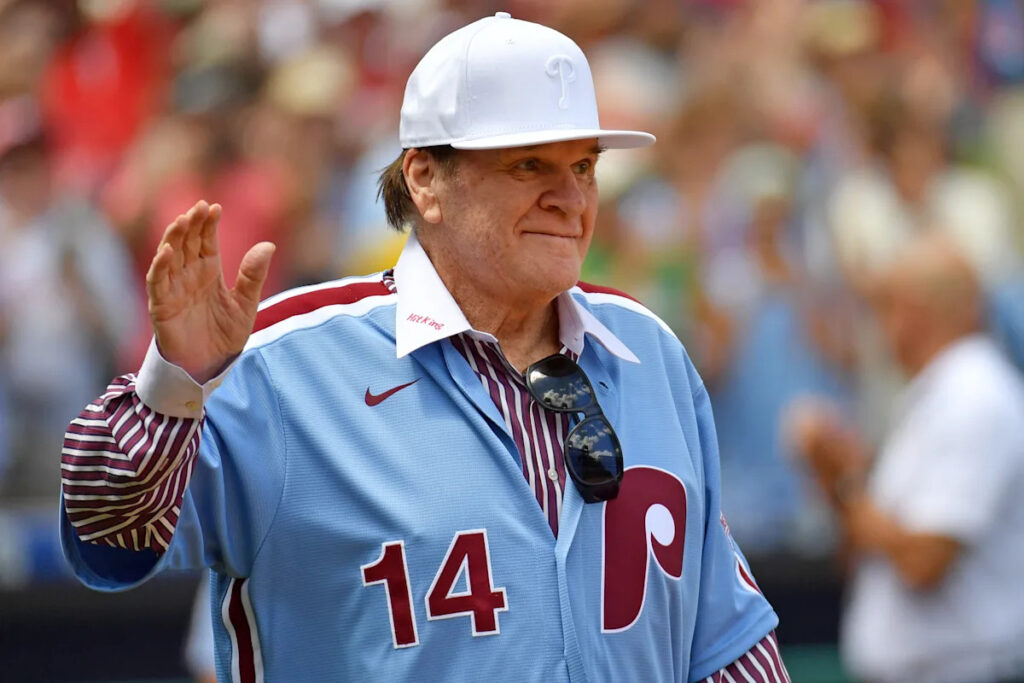Major League Baseball commissioner Rob Manfred took a major step Tuesday toward allowing both Pete Rose and “Shoeless” Joe Jackson into the Baseball Hall of Fame.
Manfred officially removed Rose, Jackson and all other deceased players from MLB’s permanently ineligible list on Tuesday. He ruled that the league’s punishment of banned individuals ends after their deaths.
“Obviously, a person no longer with us cannot represent a threat to the integrity of the game,” Manfred wrote in a letter to attorney Jeffrey M. Lenkov, who petitioned for Rose’s removal from the list earlier this year. “Moreover, it is hard to conceive of a penalty that has more deterrent effect than one that lasts a lifetime with no reprieve.
“Therefore, I have concluded that permanent ineligibility ends upon the passing of the disciplined individual, and Mr. Rose will be removed from the permanently ineligible list.”
Presumably, the move opens the door for the Baseball Hall of Fame to induct both Rose and Jackson in the future. That could happen as soon as 2028.
Jackson and seven other members of the Chicago White Sox were banned from the league in 1921 for their role in fixing the 1919 World Series. Rose was banned in 1989 after an investigation determined that he bet on games while managing the Cincinnati Reds. In 1991, the Hall of Fame determined that any player on MLB’s permanently ineligible list would also be ineligible for induction into the Hall of Fame — something that became known as “the Pete Rose rule.”
Rose died in September at age 83. Jackson died in 1951.
Many people, including President Donald Trump, have advocated for Rose to be inducted into the Hall of Fame in recent years. Rose called for it just 10 days before his death, too.
“I’ve come to the conclusion — I hope I’m wrong — that I’ll make the Hall of Fame after I die,” he said. “Which I totally disagree with, because the Hall of Fame is for two reasons: your fans and your family … It’s for your family if you’re here. It’s for your fans if you’re here. Not if you’re 10 feet under.”
Rose is MLB’s all-time leader in hits, games played, at-bats, singles and outs. He won the World Series three times in his career, twice with the Reds and once with the Philadelphia Phillies.
Rose repeatedly had paths back to baseball after his scandal and was reportedly offered an opportunity for reinstatement if he came clean and stopped associating himself with gambling. But he declined. He eventually admitted to betting on his own team while a manager, and he was a mainstay in casinos until his death. He was also accused of having a sexual relationship with a girl under 16 years old during his playing days.
Trump, however, got behind Rose and said earlier this year that he would offer him a complete pardon. It’s unclear what that pardon would cover, though Rose served five months in federal prison in 1990 on tax crimes. Manfred called Trump on Tuesday to discuss his decision, according to ESPN.
“Shoeless” Joe Jackson, seen here during his days playing for Cleveland, was removed from MLB’s permanently ineligible list on Tuesday. (Sporting News via Getty Images)
(Sporting News Archive via Getty Images)
Jackson held a career batting average of .356, which is the fourth-highest in MLB history. Although he accepted money to throw the 1919 World Series, Jackson batted .375 in the series, didn’t make a single error and hit the only White Sox home run. He was considered for Hall of Fame entry for decades by voters but did not make it in. Rose, because of the “Pete Rose rule,” was never on the ballot.
Manfred’s decision Tuesday removed 16 former players — Rose, Jackson, Eddie Cicotte, Happy Felsch, Chick Gandill, Fred McMullin, Swede Risberg, Buck Weaver, Lefty Williams, Joe Gedeon, Gene Paulette, Benny Kauff, Lee Magee, Phil Douglas, Cozy Dolan and Jimmy O’Connell — and one former owner — Phillies owner William Cox — from the ineligible list.
While Rose and Jackson are now eligible for the Hall of Fame, induction is not guaranteed by any means. Their candidacies will be decided by the Classic Baseball Era Committee, which considers players whose careers ended at least 15 years prior. That committee won’t meet again until December 2027. Players need votes from at least 12 of the 16 members to make it in.
Read the full article here

